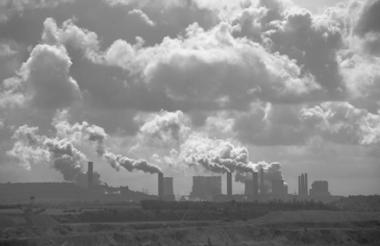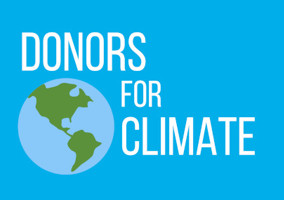Charities have criticised the latest efforts to forge international agreement around reducing the impacts of the climate crisis, saying that leaders have not gone far enough.
Leaders from around the world met in Glasgow for two weeks of talks which resulted in a watered-down agreement after China and India forced a last-minute change to language around coal.
Overall, the pledges which were made last week are estimated to lead to a temperature rise 2.4 degrees, not the 1.5 degrees people had aimed for.
Campaigners also criticised governments and corporations for failing to deliver on the finance needed to support countries hit hardest by the impact of the climate crisis.
ActionAid International: ‘This outcome is an insult’
Teresa Anderson, climate policy coordinator at ActionAid International, said: “This outcome is an insult to the millions of people whose lives are being torn apart by the climate crisis.
“There were huge expectations that COP26 would finally deliver real support for the communities, farmers, women and girls who need to recover and rebuild in the aftermath of climate disasters. Countries representing the vast majority of humanity pleaded for a new funding mechanism for loss and damage.
“But the wealthy countries most responsible for our warming world - particularly the US - have blocked their ears and hung those most impacted out to dry.”
Oxfam: ‘Diplomatic efforts have once more failed to meet the scale of this crisis’
Gabriela Bucher, executive director at Oxfam International, said: “Clearly some world leaders think they aren’t living on the same planet as the rest of us. It seems no amount of fires, rising sea levels or droughts will bring them to their senses to stop increasing emissions at the expense of humanity.
“Punishing, extreme weather is already wrecking the lives of the most vulnerable. People are barely clinging on, having little resources to cope with the constant threat of losing all that they own. The world’s poorest have done the least to cause the climate emergency, yet are the ones left struggling to survive while also footing the bill.”
She highlighted that some developing countries had suggested creating a finance facility to help places recover from extreme weather events, and criticised rich countries for not agreeing to this and instead offering limited funding.
“This derisory outcome is tone deaf to the suffering of millions of people both now and in the future,” she said.
Bucher concluded: “It’s painful that diplomatic efforts have once more failed to meet the scale of this crisis. But we should draw strength from the growing movement of people around the world challenging and holding our governments to account for everything we hold dear.”
Fairtrade International: ‘A frustrating conclusion’
Mary Kinyua, the Fairtrade International board representative to COP26, said the outcome was “a frustrating conclusion to this summit filled with hope that we would see a start to the healing of our world”.
She added: “It is painful to see that no commitment at all has been made to pay for the unavoidable loss and damage faced by our communities.”
Where funding, such as the Just Rural Transition Fund, has been committed Kinyua said it must reach farmers and communities.
“Fairtrade farmers and citizens of the global Fairtrade movement will not let this stand. We are already working to tackle the climate crisis on the frontline in our communities, with the knowledge and love of the land that we have as farmers,” she said.
“And we know that there are Fairtrade buyers and businesses and supporters who will stand with us, working alongside us day to day to do what we can and calling for action until promises are finally kept. We are doing our part, it’s time for the leaders to do theirs.”
Global Justice Now: ‘Hollowed out agreement’
Nick Dearden, director of Global Justice Now, described the agreement as “hollowed-out” which “shows that, for all the lip service they paid, world leaders and big business have not listened”.
“From the very start, the UK presidency set this summit up for failure. A sanitised COP, captured by corporate interests and inaccessible to the global south, was never going to adequately or equitably respond to the climate crisis.”
Ashden: ‘We need radical change today
Harriet Lamb, CEO of Ashden, a funder that supports climate innovations, said: “Leaders have pledged action tomorrow – when we need radical change today. The proven, practical solutions that can deliver lower emissions and climate justice already exist.
“With COP done and dusted, we need far more support for the frontline innovators proving climate action is realistic and creates benefits for all, such as new and better jobs.”
WaterAid: ‘Communities need more than words’
Tim Wainwright, chief executive of WaterAid in the UK, said: “There were signs of global ambition over the past days, and it’s encouraging to see richer countries acknowledge they need to step up financing to help poorer countries battle the impacts of climate change.
“But communities hit hard by climate change across the globe need more than words – they need action supported by strong commitments and clear targets to help them adapt to increased droughts and flooding.”
With COP taking place in Egypt next year, he added: “In the run up to COP27, governments and the private sector must use the coming year to urgently make good on their promises of today and truly invest in adaptation measures for millions.
“A top priority for this urgent investment is access to clean water, which is the first line of defence to survive the unavoidable impacts of the crisis.”
CAFOD: ‘A major disappointment’
Neil Thorns, director of advocacy at CAFOD, said: “COP26 is a major disappointment to CAFOD’s partners working with poor communities, it simply hasn't delivered the urgent action or justice required.
“Instead, it has been pushed until 2022 to limit temperature increases to 1.5C and deliver the climate finance so desperately needed. For some this will be too late, which is simply not acceptable.”
Related articles












